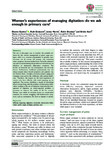Women’s experiences of managing digitation: do we ask enough in primary care?
| dc.contributor.author | Geng, Shuaibo | |
| dc.contributor.author | Endacott, Ruth | |
| dc.contributor.author | Morris, J | |
| dc.contributor.author | Shankar, Rohit | |
| dc.contributor.author | Kent, B | |
| dc.date.accessioned | 2018-09-04T06:55:02Z | |
| dc.date.available | 2018-09-04T06:55:02Z | |
| dc.date.issued | 2018-08 | |
| dc.identifier.issn | 2054-2704 | |
| dc.identifier.issn | 2054-2704 | |
| dc.identifier.uri | http://hdl.handle.net/10026.1/12223 | |
| dc.description.abstract |
<jats:p> The aim of this paper was to consider the available evidence for the current management of pelvic organ prolapse, which is a common presentation in primary care. However, not all women will present, only presenting when symptoms become bothersome. Particular attention was paid to understanding the problem of rectocele and its influence on obstructive defaecation symptoms. The burden of rectocele and its consequences are not truly known. Furthermore, healthcare professionals may not always enquire about bowel symptoms and patients may not disclose them. Complex emotions around coping and managing stress add to the challenges with seeking healthcare. Therefore, the impact on the lived experience of women who have difficulty with rectal emptying can be significant. The review identified a dearth of knowledge about women living with the problem of obstructive defaecation resulting in the use of digitation. Improving the management of digitation, an under-reported problem, is necessary to improve the quality of life for women. Primary care needs to increase access to conservative measures for women struggling with bothersome symptoms, such as constipation, the need to digitate or anxiety. </jats:p> | |
| dc.format.extent | 205427041878361-205427041878361 | |
| dc.format.medium | Electronic-eCollection | |
| dc.language | en | |
| dc.language.iso | eng | |
| dc.publisher | SAGE Publications | |
| dc.subject | difficulty emptying | |
| dc.subject | digitation | |
| dc.subject | obstructive defaecation | |
| dc.subject | pelvic organ prolapse | |
| dc.subject | primary care | |
| dc.subject | rectocele | |
| dc.title | Women’s experiences of managing digitation: do we ask enough in primary care? | |
| dc.type | journal-article | |
| dc.type | Journal Article | |
| plymouth.author-url | https://www.ncbi.nlm.nih.gov/pubmed/30094048 | |
| plymouth.issue | 8 | |
| plymouth.volume | 9 | |
| plymouth.publication-status | Published | |
| plymouth.journal | JRSM Open | |
| dc.identifier.doi | 10.1177/2054270418783616 | |
| plymouth.organisational-group | /Plymouth | |
| plymouth.organisational-group | /Plymouth/Faculty of Health | |
| plymouth.organisational-group | /Plymouth/Faculty of Health/School of Nursing and Midwifery | |
| plymouth.organisational-group | /Plymouth/REF 2021 Researchers by UoA | |
| plymouth.organisational-group | /Plymouth/REF 2021 Researchers by UoA/UoA03 Allied Health Professions, Dentistry, Nursing and Pharmacy | |
| plymouth.organisational-group | /Plymouth/Research Groups | |
| plymouth.organisational-group | /Plymouth/Research Groups/Institute of Health and Community | |
| plymouth.organisational-group | /Plymouth/Research Groups/Plymouth Institute of Health and Care Research (PIHR) | |
| plymouth.organisational-group | /Plymouth/Users by role | |
| plymouth.organisational-group | /Plymouth/Users by role/Academics | |
| dc.publisher.place | England | |
| dc.identifier.eissn | 2054-2704 | |
| dc.rights.embargoperiod | Not known | |
| rioxxterms.versionofrecord | 10.1177/2054270418783616 | |
| rioxxterms.licenseref.uri | http://www.rioxx.net/licenses/all-rights-reserved | |
| rioxxterms.type | Journal Article/Review |


